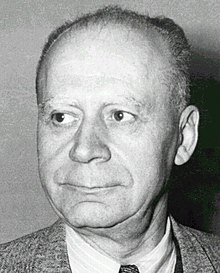
Șerban Vodă Cemetery is the largest and most famous cemetery in Bucharest, Romania.

Lucrețiu Pătrășcanu was a Romanian communist politician and leading member of the Communist Party of Romania (PCR), also noted for his activities as a lawyer, sociologist and economist. For a while, he was a professor at the University of Bucharest. Pătrășcanu rose to a government position before the end of World War II and, after having disagreed with Stalinist tenets on several occasions, eventually came into conflict with the Romanian Communist government of Gheorghe Gheorghiu-Dej. He became a political prisoner and was ultimately executed. Fourteen years after Pătrășcanu's death, Romania's new communist leader, Nicolae Ceaușescu, endorsed his rehabilitation as part of a change in policy.
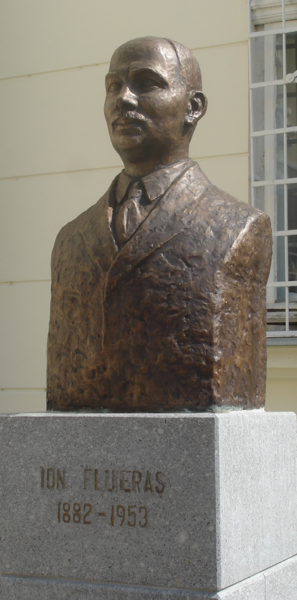
IoanFlueraș was a Romanian social democratic politician and a victim of the communist regime.
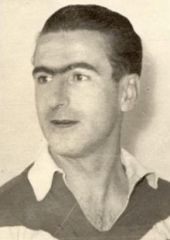
Titus Ozon was a Romanian international football striker and manager. He was considered one of the greatest talents of the postwar in the Romanian football, famous for his extraordinary ability to dribble.
Alexandru Nicolschi was a Romanian communist activist, Soviet agent and officer, and Securitate chief under the Communist regime. Active until 1961, he was one of the most recognizable leaders of violent political repression.
The Socialist Party of Romania was a Romanian socialist political party, created on December 11, 1918 by members of the Social Democratic Party of Romania (PSDR), after the latter emerged from clandestinity. Through its PSDR legacy, the PS maintained a close connection with the local labor movement and was symbolically linked to the first local socialist group, the Romanian Social-Democratic Workers' Party. Its creation coincided with the establishment of Greater Romania in the wake of World War I; after May 1919, it began a process of fusion with the social democratic groups of in the former territories of Austria-Hungary — the Social Democratic Parties of Transylvania, Banat and Bukovina. The parties adopted a common platform in October 1920. Progressively influenced by Leninism, the PS became divided between a maximalist majority supporting Bolshevik guidelines and a reformist-minded minority: the former affiliated with the Comintern as the Socialist-Communist Party in May 1921, while the minority eventually established a new Romanian Social Democratic Party.
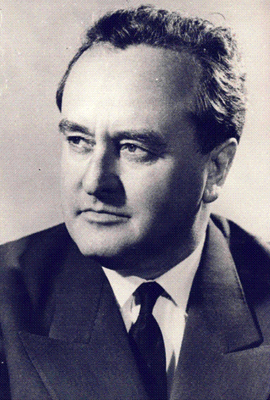
Avram Bunaciu was a Romanian communist politician and jurist who served as the Minister of Justice, Minister of Foreign Affairs and in March 1965 was for 5 days the acting President of the State Council of Romania.
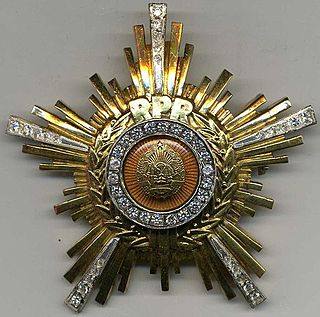
The Order of the Star of the Socialist Republic of Romania, from 1948 to 1965 the Order of the Star of the Romanian People's Republic, was the second-highest honor bestowed by the Socialist Republic of Romania. Established on 12 January 1948, during the regime's first month, it came in five classes:
Events from the year 1948 in Romania. The year saw the formalisation of the Romanian People's Republic.

Events from the year 1950 in Romania. The year saw Romania build relationships with other Communist states, including China and East Germany.

Events from the year 1951 in Romania. The year saw the Bărăgan deportations.

Events from the year 1952 in Romania. After a new trade agreement is signed with the Soviet Union, a new constitution affirms ties with the Communist state, indicated by a red star being added to the coat of arms, emblem and flag.
Events from the year 1954 in Romania. The year was marked by the 1954 Romanian blizzard.
Events from the year 1958 in Romania. The year saw the end of the Soviet occupation of Romania with the last Soviet troops leaving the country.
Events from the year 1959 in Romania. During the year, the country hosted the first International Mathematical Olympiad.
Events from the year 1933 in Romania. The year saw the Grivița strikes, the formation of the Little Entente, and the assassination of the Prime Minister Ion G. Duca.
Events from the year 1960 in Romania. At the 1960 Summer Olympics, Iolanda Balaș wins the first Romanian Olympic gold medal.
Events from the year 1962 in Romania. The year saw the end of the collectivization of agriculture and increasing de-satellization of Communist Romania as the country last publicly supported the Soviet Union against China and took part is Warsaw Pact army exercises.
Events from the year 1964 in Romania. The year saw increasing separation from Soviet influence.
Events from the year 1963 in Romania. The year saw the continued de-satellization of Communist Romania.


